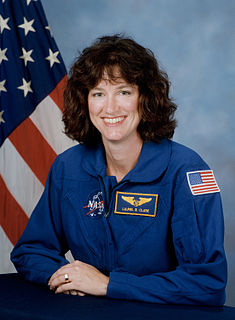A Quote by Rusty Schweickart
We are going to learn how to relate to the Earth and our own natural environment here by looking seriously at space colony ecologies.
Related Quotes
The frontier in space, embodied in the space colony, is one in which the interactions between humans and their environment is so much more sensitive and interactive and less tolerant of irresponsibility than it is on the whole surface of the Earth. We are going to learn how to relate to the Earth and our own natural environment here by looking seriously at space colony ecologies.
It is through our technology that we have been able to fly far away from earth to learn, in truth, how precious it is. It is no coincidence that our awakening to the special nature of our world and to its uniquely balanced environment and its limitations coincided with our first glimpse of earth from outer space, through the eyes of astronauts, television cameras and photographic equipment.
Our population and our use of the finite resources of planet Earth are growing exponentially, along with our technical ability to change the environment for good or ill. But our genetic code still carries the selfish and aggressive instincts that were of survival advantage in the past. It will be difficult enough to avoid disaster in the next hundred years, let alone the next thousand or million. Our only chance of long term survival, is not to remain inward looking on planet Earth, but to spread out into space.
Flying has changed how we imagine our planet, which we have seen whole from space, so that even the farthest nations are ecological neighbors. It has changed our ideas about time. When you can gird the earth at 1,000 m.p.h., how can you endure the tardiness of a plumber? Most of all, flying has changed our sense of our body, the personal space in which we live, now elastic and swift. I could be in Bombay for afternoon tea if I wished. My body isn't limited by its own weaknesses; it can rush through space.
Well, we now have such a photograph... Has any new idea been let loose? It certainly has. You will have noticed how suddenly everybody has become seriously concerned to protect the natural environment... It seems to me more than a coincidence that this awareness should have happened at exactly the moment man took his first step into space.
I began to learn about the universe myself and take it seriously. I know the names of the stars. I know how near or far the heavenly bodies are from our own planet. I know our own place in the universe. I can feel the vastness of it inside myself. I began to realize with each passing fact what a wonderful and awesome place the universe is, and that helped me in comics because I was looking for the awesome.
'Environment' is not an abstract concern, or simply a matter of aesthetics, or of personal taste - although it can and should involve these as well. Man is shaped to a great extent by his surroundings. Our physical nature, our mental health, our culture and institutions, our opportunities for challenge and fulfillment, our very survival - all of these are directly related to and affected by the environment in which we live. They depend upon the continued healthy functioning of the natural systems of the Earth.
We imagine going to the moon and planting a flag, going to an asteroid and mining, going to Mars and setting up a colony. And I think that expansionist mentality is very self-destructive, especially given the kind of precarious relationship we now have to the ecosystem here on Earth, because it allows us to imagine that Earth is disposable.































